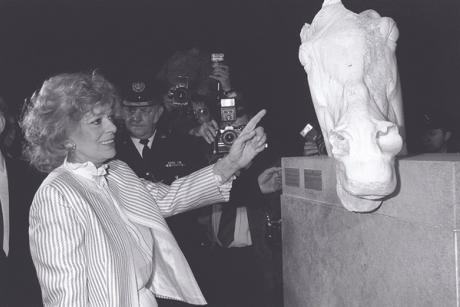
Recently declassified UK government documents reveal that the Foreign Office rejected lobbying by the British Museum to keep the Parthenon Marbles in 1983, the year a formal claim was first made.
The future of the Marbles became a major issue during a visit to London by the Greek culture minister at the time, internationally renowned actress Melina Mercouri. Government newspapers report that her “colorful personality and romantic cause has garnered considerable interest and media coverage”.
Foreign Office staff feared that Mercouri would win the debate: “On some occasions her dramatic flourishes border on histrionics, but she undoubtedly stole the show from her protagonist, David Wilson. [director] of the British Museum”. This is particularly the case during a “television exchange of views between the two on a sofa” at the Institute of Contemporary Arts in London, following a lecture she gave there on May 22, 1983.
Winning the argument “hands down”
The Foreign Office recorded that Mercouri maintained that the marbles “form an integral part of a monument which represents the national spirit of Greece”. Wilson replied that they are part of a museum that is a unique international institution that “should not be broken up.” But officials concluded that Mercouri “won the argument hands down.”
The British ambassador to Athens, Peregrine Rhodes, then intervened, adding that in Greece “the arguments put forward by Wilson risk being counter-productive”. Just before Mercouri’s visit, the ambassador had argued that the British government should take a hard line: “faking the issue can only pile up trouble for the future”.
The United Kingdom’s relations with the European Community (precursor of the European Union) are threatened by the Marbles conflict, which worries Burke Trend, the president of the British Museum. He warned the Foreign Office that if museum administrators were told by the government that they “would have to do something to accommodate” Greeks, because of their membership of the European Community, it would create “a very difficult situation “.
The Foreign Office’s Head of Cultural Relations, John Macrae, added his view: “The problem seemed to me to be one that would remain with us for some time to come. We had to live with it and contain it as much as possible”. It was in June 1983, exactly 40 years ago.
Ineffective
The British Museum’s curator of classical antiquities, Brian Cook, appeared to the Foreign Office to be as ineffectual as its director. At another meeting during Mercouri’s visit, Cook made “a disappointing and pedantic defense, aimed at proving that Elgin was not guilty of vandalism and that the Parthenon was a symbol of Athenian imperialism, not freedom and the Greek nation”. Cook referred to the sculptures as the “Elgin Marbles” (and wrote a museum book with that title, which was reprinted until 2005), rather than what are now universally referred to as the Parthenon Marbles.
Macrae had commented that “it’s a shame that the BM [British Museum] does not make a more effective defense of their claim to the Marbles”. He felt this was a moral and political question that the British people should answer through Parliament: “The BM should remember that what Parliament gives, Parliament takes away.”
Legislative ban
Under the British Museum Act 1963, approved by Parliament and still in force, trustees are not allowed to alienate the collection, a prohibition still used to reject Greek restitution claims.
In May 1983, just before Mercouri’s arrival, Hugh Jenkins, a former Labor Arts Minister, had proposed an amendment to the 1963 Act to allow alienation. The Conservative government opposed it and the amendment was defeated. As Paul Channon, then Minister for the Arts, wrote in a note to the Foreign Office file: the return of the Marbles “would trigger a process of piecemeal dismantling of the collections of the British Museum”.
It was five months after Mercouri’s visit that the Greek government officially claimed the Parthenon Marbles. The controversy has certainly not gone away. Today, the museum continues to emphasize that it cannot alienate due to the 1963 law.
No change plan
Prime Minister Rishi Sunak said on March 13 when asked about the Marbles: “The UK has cared for the Elgin Marbles for generations. The British Museum collection is protected by law and we do not intend to alter it.
Meanwhile, British Museum trustees have recently changed their stance and are now more open to a long-term (but not legal) loan
restitution) of at least part of the marbles, in exchange for reciprocal loans of Greek antiquities to London. This is proposed by George Osborne, Chairman of the Trustees and former Chancellor of the Exchequer.
Osborne said in February: “We are talking to the Greek government… about a new arrangement.” He added that the 1963 law prevents disposal of artifacts, commenting that a change in the law is “beyond my authority”. A statement from the British Museum confirms that it has “called for a new Parthenon partnership with colleagues in Greece and that constructive discussions are underway”.
